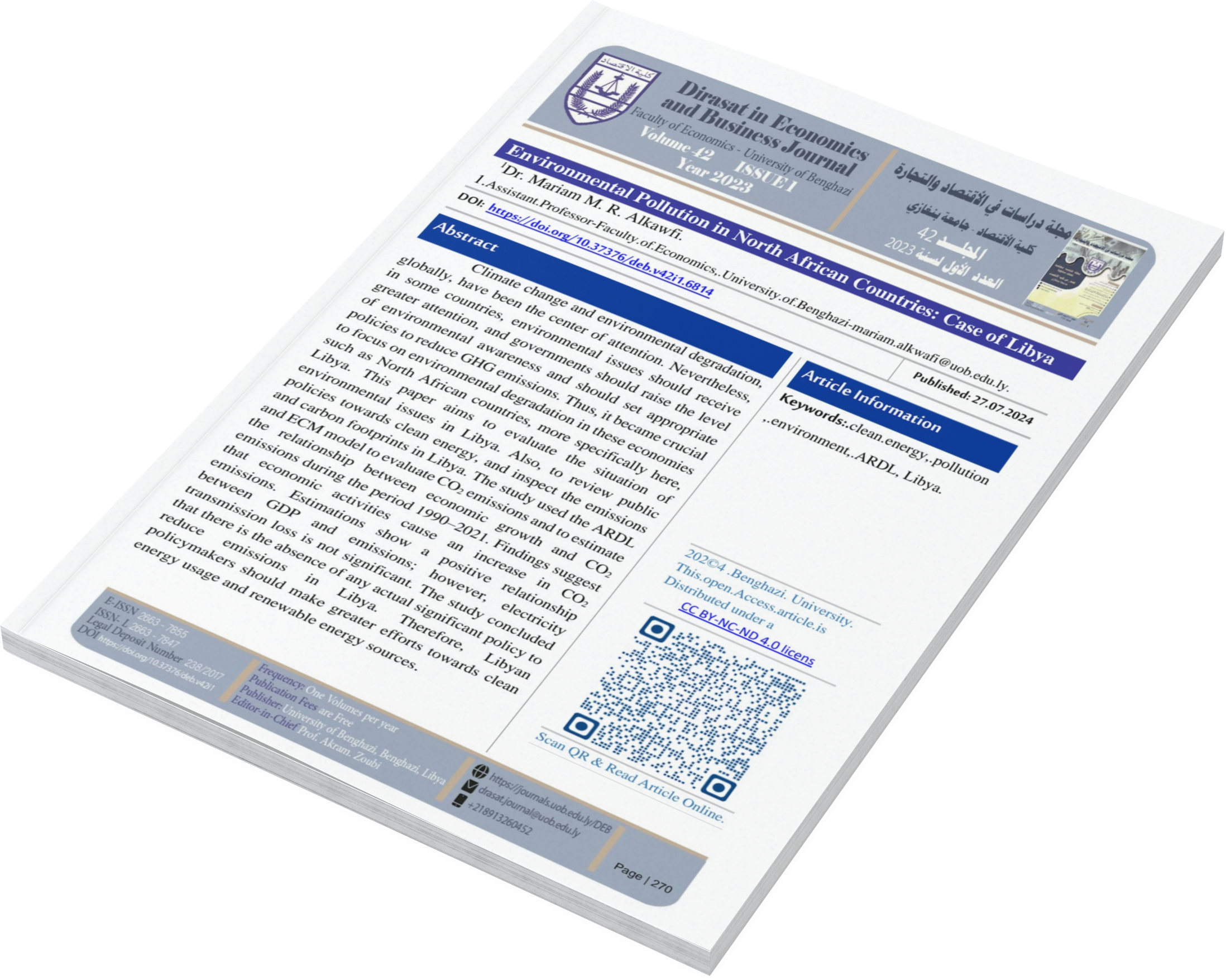Environmental Pollution in North African Countries: Case of Libya
DOI:
https://doi.org/10.37376/deb.v42i1.6814Keywords:
clean.energy, pollution, environment, ARDL, LibyaAbstract
Climate change and environmental degradation, globally, have been the center of attention. Nevertheless, in some countries, environmental issues should receive greater attention, and governments should raise the level of environmental awareness and should set appropriate policies to reduce GHG emissions. Thus, it became crucial to focus on environmental degradation in these economies such as North African countries, more specifically here, Libya. This paper aims to evaluate the situation of environmental issues in Libya. Also, to review public policies towards clean energy, and inspect the emissions and carbon footprints in Libya. The study used the ARDL and ECM model to evaluate CO2 emissions and to estimate the relationship between economic growth and CO2 emissions during the period 1990–2021. Findings suggest that economic activities cause an increase in CO2 emissions. Estimations show a positive relationship between GDP and emissions; however, electricity transmission loss is not significant. The study concluded that there is the absence of any actual significant policy to reduce emissions in Libya. Therefore, Libyan policymakers should make greater efforts towards clean energy usage and renewable energy sources.
Downloads
References
A..Albarghathi,.R...Zakaria,.A..Tahir,.A..khalil,.A..Alfergani.and.F..Mohamed..(2018)..Economic.Feasibility,.Design,.and.Simulation.of.Centralized.PV.Power.Plant..The.9th.International.Renewable.Energy.Congress.(IREC.2018).
A.Wajahat,.A..Azrai.and.A..Azam..Re-visiting.the.environmental.Kuznets.curve.hypothesis.for.Malaysia:.Fresh.evidence.from.ARDL.bounds.testing.approach..Volume.77,.September.2017,.Pages.99-1000..Available.online:.https://www.sciencedirect.com/journal/renewable-and-sustainable-energy-reviews
Elmanfi,.E..Elshrif,.Z..Ragab,.A..khalil.and.F..Mohamed.(2019)..Sustainable.Street.Lighting.System.Design.in.Libya..The.10th.International.Renewable.Energy.Congress.(IREC.2019).
Greenhouse.Gas.Emissions.Factsheet:.Libya.report.(2017)..Available.online:.http:www.cliamtelinks.org/
http://data.worldbank.org/indicator
International.Renewable.Energy.Agency.(IRENA).(2021)..http://www.irena.org/
M..Kazemi.and.I.Ebrahimi..2008..Examining.Enviromental.Kuznets.Curve.in.Middle.East..Volume.10,.Issue.34.-.Serial.Number.34..April.2008.Pp.57-71..Avaliable.online:.https://ijer.atu.ac.ir/issue_764_765.html?lang=en
M..Monserrate.&.M..Fernandez.(2017)..An.Environmental.Kuznets.Curve.for.N2O.emissions.in.Germany.an.ARDL.approach..Natural.Resources.Forum.-.Wiley.Online.Library.2017..Available.online:.https://doi.org/10.1111/1477-8947.12122,.https://onlinelibrary.wiley.com/
R..Alam.&.M..Adil..2019.Validating.the.environmental.Kuznets.curve.in.India_.ARDL.bounds.testing.framework..OPEC.Energy.Review.-.Wiley.Online.Library..Sep..2019,.Vol.43..issue.3.Pp.277-300..Available.online.:.https://doi.org/10.1111/opec.12156
S..Jordaan.and.K..Surana..IEA.report.2019..Availiable.online:.http://theconversation.com
S.A.Al-Hashmi.,.M..Sharif.1.,M..Elhaj.2.and.M..Almrabet.(2017)..The.Future.of.Renewable.Energy.in.Libya..University.Bulletin.–.ISSUE.No.19-.Vol..(3).–.July.–.2017..Pp109-122.
Saleheen.Khan,.Muhammad.Shahbaz.and.Farooq.Ahmed.Jamthe.Estimation.Of.The.Environmental.Kuznets.Curve.In.Kazakhstan..The.Journal.of.Energy.and.Development.Vol..45,.No..1/2.(Autumn.2019.and.Spring.2020)..Pp..93-112.
Yale.Center.for.Environmental.Justice,.Fact.Sheets.(Libya)..USAID.Publications.visited.on:.04/27/2022.

Downloads
Published
How to Cite
Issue
Section
License
Copyright (c) 2024 Dirasat in Economics and Business

This work is licensed under a Creative Commons Attribution-NonCommercial-NoDerivatives 4.0 International License.







